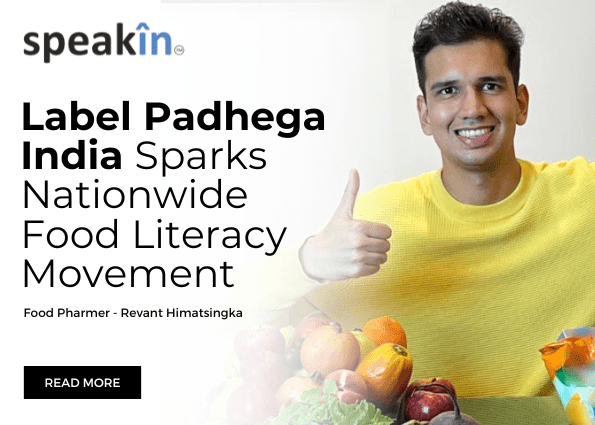‘Label Padhega India’ Sparks Nationwide Food Literacy Movement

Food literacy in India has historically been limited, exacerbating broader health and nutrition issues. Defined by the food and nutrition choices individuals make, food literacy significantly impacts health outcomes. Many rural Indians lack adequate educational resources, hindering their understanding of healthy eating. This gap complicates efforts to distinguish between nutritious and less nutritious foods, often conflicting with traditional practices. Education stands as a pivotal tool for personal empowerment in India’s development, evolving beyond basic literacy to encompass a comprehensive understanding and analysis of information. Modern initiatives also prioritize consumer literacy, enhancing awareness of product labels and packaged goods information.
“Label Padhega India” is a movement started by Revant Himatsingka to spread food literacy in India. The tag, in Hindi, reads as “India will read labels”. In view of empowering consumers, this initiative is important. This will help consumers make informed decisions. Comprehending labels empowers individuals to interpret nutritional content, ingredients, manufacturing details, and other critical information that significantly influences health and well-being.
This movement represents a larger social movement in favor of responsibility and transparency in product labeling. It pushes people to inquire about and comprehend the ingredients in the goods they purchase, encouraging healthier lives and a sense of accountability on the part of businesses to offer precise and understandable information. This movement emphasizes the value of making educated decisions in a marketplace full with options, which is in line with worldwide trends toward consumer empowerment and rights.
Revant Himatsingka is praised for his strong involvement in social and environmental problems in addition to his business ventures. He has led successful initiatives that support conservation and sustainable development. Revant Himatsingka, a vocal and bold critic of misleading food marketing, argues that while consumers are aware of the health risks of junk food, they are often deceived by packaged foods marketed as healthy. His advocacy began with a viral video exposing the high sugar content in Bournvita, leading to a legal notice from Mondelez. Despite removing the video, Himatsingka continues to emphasize the health impact of frequent consumption of such products, advocating for transparency in food labeling and targeting FMCG companies’ deceptive practices, especially in developing markets like India.
Himatsingka’s educational background includes a B.S. in Management from NYU’s Stern School of Business and an MBA from Wharton. Additionally, he is a certified health coach from the Institute for Integrative Nutrition. His professional journey includes consulting at McKinsey & Company, where he was offered a package of 2 crores. And, still he left the job and started his journey as a food pharmer. He has also authored the self-help comedy book “Selfienomics”. His goals focus on stopping the marketing of junk food as healthy, promoting clean businesses, and educating Indians on reading food labels.
Active on social media, Himatsingka engages with the public on food safety issues and critiques deceptive marketing practices. His persistent efforts have garnered significant attention, influencing consumer behavior and corporate practices. Notably, his campaign prompted Maggi ketchup to reduce its sugar content by 22%. Despite legal challenges, Himatsingka’s commitment to educating the public and promoting healthier food choices remains unwavering, leveraging his online presence to advocate for substantial changes in the food industry.
Connect with our team for further insights and to engage with Revant Himatsingka.
Get in touch at lets.speak@speakin.co or https://bit.ly/FoodPharmer





